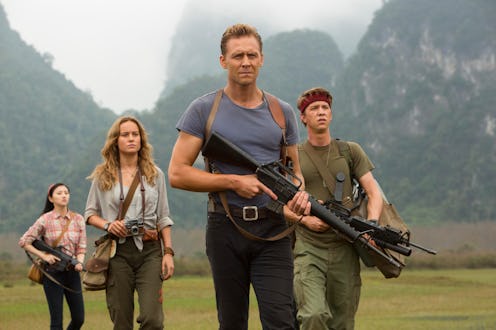Entertainment
How 'Kong's 1970s Political Climate Mirrors 2017

When Jordan Vogt-Roberts was pitched the idea of directing a King Kong film set in 1917, he initially turned it down. King Kong is a creature wrought with cinematic history, a beast that has appeared in dozens of iterations over the last hundred years, and Vogt-Roberts knew that if he took on the King for the big screen it would have to be a version audiences hadn't seen before. He mused upon the idea, and came up with Kong: Skull Island, out March 10, a version set not in 1917, but the 1970s. Aside from the obvious Vietnam War-esque esthetic splendor — lush palm tree-laden landscapes, smoke bombs, and era-appropriate hits like The Hollies' "Long Cool Woman (in a Black Dress)" — there was a very specific reason the '70s appealed to the director.
"What I was super interested in was the horrific black mirror that we were living in, which is every issue that we are suddenly dealing with now," he says at the Los Angeles press day for the film. "If you look at issues in the late '70s and early '80s versus now: racial rights, sexual revolutions, gender inequality, equal pay, distrust of the government, military industrial complex, oil… it’s like, 'Oh my god, this is the same thing,' and you don’t even get to the presidential element of it."
Because of these striking similarities, (women still earn less on the dollar than men, and the Trump administration just lifted transgender bathroom access protections in schools, to name a few more recent issues) Vogt-Roberts knew Kong, though a monster of many generations, should exist in the '70s. "I became so compelled by the fact that it was a perfect mirror for our society today. I love the idea of taking characters who are disillusioned by that and thrusting them into something greater than themselves."
Also accurate to the time was the tendency for many professions at the time to be boys clubs. This is why, according to Vogt-Roberts, he wanted Brie Larson's photojournalist to be one of the only women present in the film.
"I intentionally designed the fact that Brie’s the only female, because this is the 1970s and we’re dealing with a boy’s club," he says. "I like the fact that she is surrounded by men and has to deal with everything that entails. She has to be that much better at her job and has to work that much harder and has to be that much stronger."
Politics aside, there were other elements of the era that spoke to the bearded filmmaker.
"I became obsessed with the idea of the '70s being the start of the split between myth and science. I don’t think that myth and science can co-exist," he argues. "Because on that phone you’re holding right now, you can Google, 'Does Santa Claus exist?' We didn’t have that when we were younger. The '70s was when modern computers were starting to take off. Now we live in an age where we are completely computer-driven and that’s removed the wonder and the unknown of myth."
Because of this, the idea that a group of explorers (Larson, Tom Hiddleston, Samuel L. Jackson, among others) could uncover an uncharted island never before seen by man was, well, actually kind of reasonable. And part of the myth of Kong is that he's a huge threat to humans. In the presence of the great King Kong, we are no longer an apex predator.
"As humans we don't talk about how crazy it is that we’ve removed ourselves from the food chain. We talk about how great it is: We have cars, and internet, and medicine, but no one in their daily life is like, 'You know what I’m thankful for, the fact that a tiger hasn’t eaten me.' I love the idea of putting people back in the food chain, what that does to them, and how it changes them."
Though Kong: Skull Island is two hours of action-packed fun, it's also a timely reflection of the current state of America. Toss in an A-list cast, a killer soundtrack, a gorgeous, breathtaking backdrop, and one larger-than-life ape who may or may not eat humans and you've got a unique, culturally relevant flick.
Count me in.